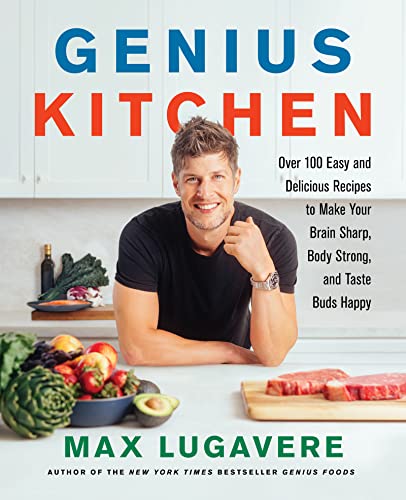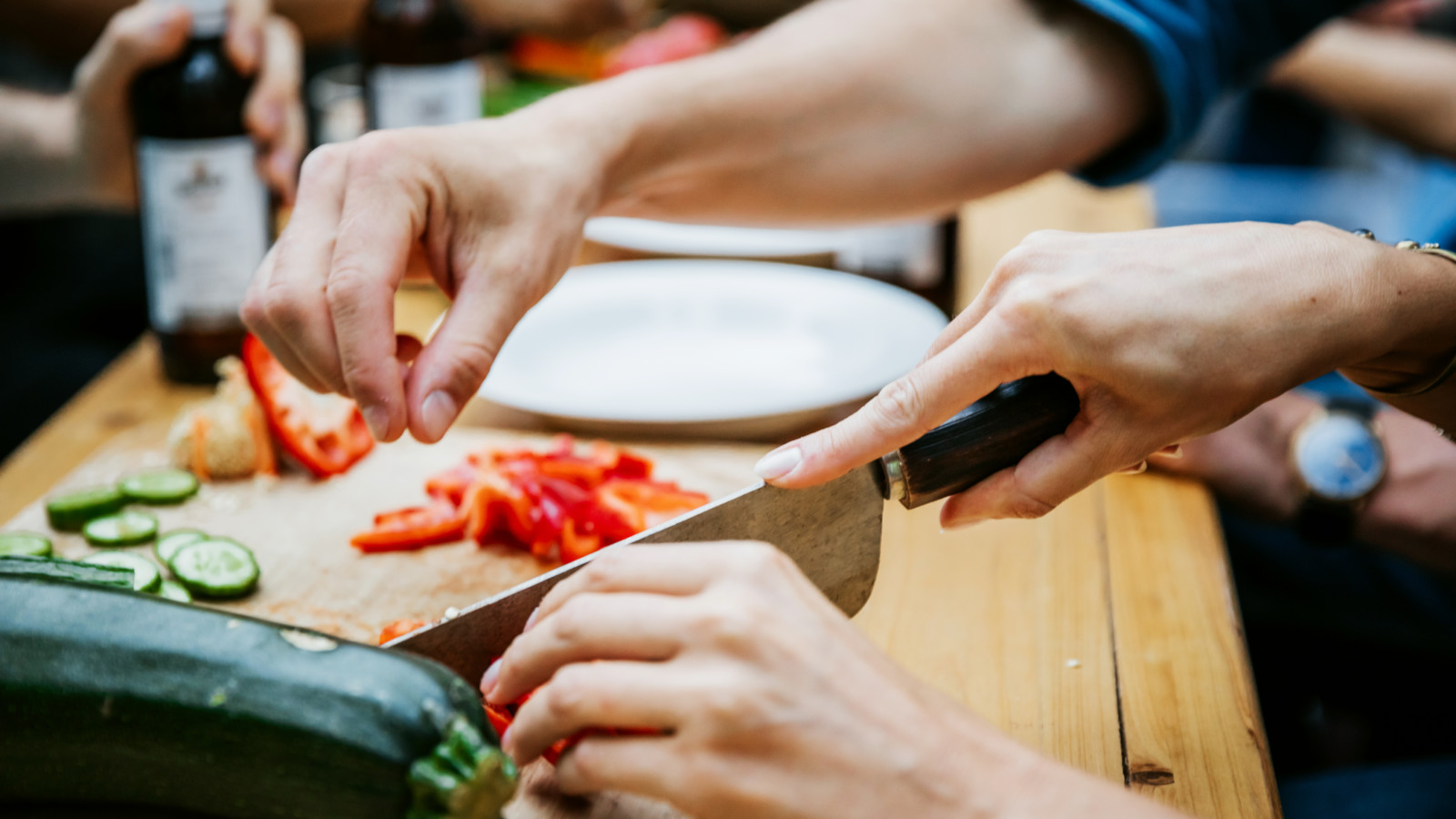My mother, Kathy, began to complain of brain fog in 2010. At the time, I didn’t think it was a big deal. She was fifty-eight, and I assumed her troubles were just a natural part of getting older. Many trips to many doctors’ offices later, we found out what was really going on: the beginnings of a rare form of dementia. It was incurable, progressive, and with symptoms akin to having Parkinson’s disease and Alzheimer’s disease at once.
In the months that followed, my mom began struggling to find her words or complete her thoughts—not easy for a woman who always had something to say. Eventually, even basic tasks became a challenge. One night she got trapped in the bathroom because she’d forgotten how to use the door handle. A knot would form in my stomach every time I’d see her struggle.
My mother had always loved food, and she relished cooking for the family.. But her growing impairment would make ordinary tasks like using a knife or tending to an open flame dangerous. That’s when I started to cook with her. She got to continue doing what she loved, and it helped make things feel normal when they were anything but.
A lifelong New Yorker and bon vivant, my mother also loved going out to eat, but her increasing fatigue made that hard as well. Still, I seized any opportunity to get her out of the house. On one particular late summer night, we had gone to dinner to one of our favorite neighborhood restaurants. It was busy but not loud, and the waitstaff was welcoming and kind to my mom.
I had spent the past few years studying nutrition, and I’d seize any opportunity to share my love for healthy eating with my mom—even when dining out. Whether or not she cared—I’d get an eye roll regardless—my mom was always happy to indulge me as we ate. On this night, however, something was off. She was quiet and had no appetite. In fact, she didn’t eat a thing. I was worried.
The next day, I did what I had become so accustomed to doing: I took her to her doctor. Standing with her in the waiting room, I became suddenly aware of how decrepit she had gotten. She barely spoke and struggled to hold the saliva in her mouth. I took a tissue from the reception desk and gently wiped her lips and then held her hand as we walked into the doctor’s office. He performed a routine exam and found nothing out of the ordinary.
Some days later, I was in Los Angeles for work when my brother called me. My mother’s condition worsened while I was away, and he had taken her to the emergency room. Scared that something serious was in motion, I flew home and joined them, more anxious than I could ever remember being. I arrived at the hospital just as they had completed an MRI of her abdomen. The attending physicians gathered around me and my two brothers, who had left work early to be there.
Pancreatic cancer, they said.
As the doctors gave us the prognosis, I was in disbelief. How could this be? We—she—had already been through so much.
The following months were filled with every emotion a person can have: stress, anger, frustration, guilt, and yes, even joy. Each moment with my mom during those last few months was at once beautiful and sad. We would try to feed her nourishing foods with what little appetite she had, but in the end, we sought to bring her joy with her favorite treats: strawberry shortcake pastries from Veniero’s, a local New York baker.
When she could no longer feed herself, my brothers and I would each take turns, grateful for those remaining moments with her.
MY FOOD PHILOSOPHY
When my mom first became sick, I set out to learn as much as I could about the role that food plays in the health of the body and brain. Since then, I’ve been invited to share my findings at conferences in my home country and abroad. I’ve even had the opportunity to contribute to academic literature as well as teach healthcare professionals (including doctors!) about nutrition. And I’ve published two books, Genius Foods and The Genius Life, which thousands around the world have used to achieve greater health and vitality.
I discovered that many of the chronic diseases people struggle with today— type 2 diabetes, cancer, heart disease, and dementia—begin years, if not decades, before signs and symptoms. In that time, the food we eat (and how we live our lives) can influence our fate. But I also learned that food is a profound gift. In our busy world as we rush from obligation to obligation, we often forget to slow down and appreciate the meal in front of us. In this book, I will celebrate the act of cooking and eating in the hope that it brings joy and good health to your life.
My mother raised me to appreciate a wide variety of flavors. She enjoyed simple, no-frills cooking, but she also loved exposing me to new and daring cuisines from all over the world. On top of that, I’ve lived in New York, Miami (where I attended college), and Los Angeles, three of the world’s great cultural melting pots. As a result, my recipes are designed to make a statement to your taste buds with bold and exciting, internationally influenced flavors and textures.
Though I began to cook when my mother could no longer cook herself, I realized that culinary literacy (like health literacy) had become yet another aspect of life that we had outsourced. I became passionate about creating healthy food that is delicious and easy to make, and have since had the privilege to learn from chefs all around the world, many of whom I’ve interviewed on my podcast, The Genius Life. And, having a teacher like my mom didn’t hurt, either.
Most of my recipes will include low-starch vegetables, but I’ve also made use of some of my favorite tubers, like sweet potatoes, and even the occasional legume (white beans, for example). My dishes are lower in carbohydrates than more “mainstream” cookbooks, while offering you the freedom to increase or decrease the carbohydrate content to suit your needs. (When it comes to eating for good health, there is no “one-size-fits-all” diet.) All are nutrient-dense, gluten-free, and devoid of empty calories from added sugars and refined grains.
You’ll also see me place the focus on nutrients like protein and fiber, important components of healthy, nourishing food. Eating like a “genius” means allowing your hunger mechanisms to naturally recalibrate so that you feel genuinely satisfied once you’ve had enough. When you eat foods that are truly good for your body, they satiate innate hunger mechanisms in a way that fast food and packaged snacks just can’t—and you’ll discover why in the pages to come.
I wrote this book to be not just your new favorite cookbook, but a resource for your kitchen. In Part I, I’m going to do a deep dive into the science of healthy eating, breaking apart individual food components including cooking oils, dairy, fish, eggs, and even salt so that you can know how to leverage each food type for your best health yet. Then I’ll go into my methodology for optimal cooking practices, as well as how to optimize your digestion. Part II is where you’ll find my recipes—a blend of main dishes, smaller dishes, and desserts.
My hope is that by reading this book—and enjoying my dishes with your friends and loved ones—you’ll see food in a new way and you’ll be able to bring joy and pleasure into your life without guilt. And you’ll discover that you can eat foods that help you get fit and healthy without feeling like you’re compromising on taste or giving up your favorite foods to do so.
Food is an intrinsic part of who we are; it is how we communicate, experience pleasure, show love and affection, bond with friends, and nourish ourselves. As I learned with my mom, our ability to appreciate food doesn’t last forever. That’s why each mouthful should be a celebration, and I’m grateful you’ve chosen to celebrate with me. Now let’s get cooking.



